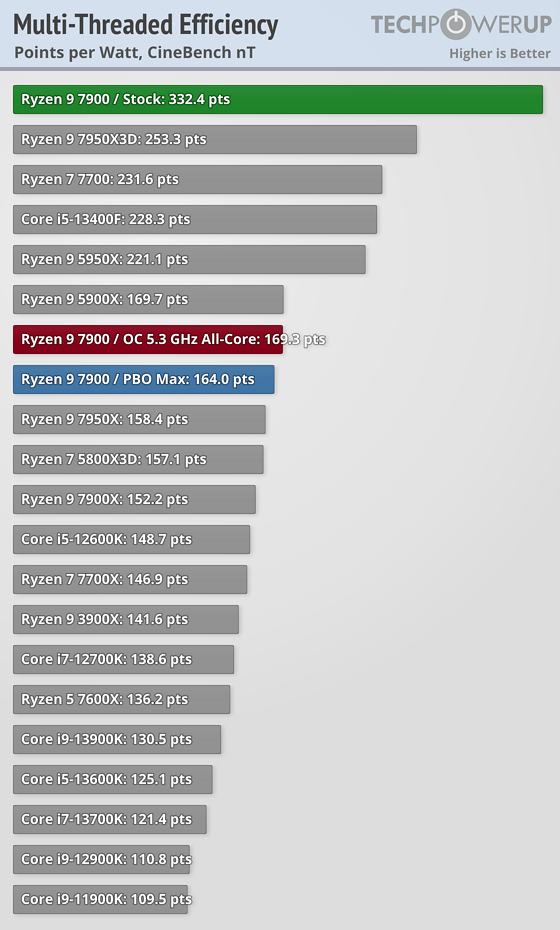Chinese media tests Intel's Core i5-14600K in Cinebench, CPU-Z benchmarks.
Intel Core i5-14600K Benchmarked, Specifications Revealed : Read more
Intel Core i5-14600K Benchmarked, Specifications Revealed : Read more
No, the problem is just that you only get to see benchmarks with the intel CPUs overclocked to the max, just because they are overclockable.About the i5, doesn't it look like Intel is just refreshing the same fast but hot architecture from years back? Every new generation brings more speed, more clocks, more power etc. It never really goes like Ryzen, which is much more efficient and fast at every generation (not absolutely, it's not fanboyism (I am a fanboy, but it's not)). Won't they ever build something from the ground up and use more than 8 performance cores without fear of setting everything on fire?

| CPU (Kerne) | 45 Watt (69 %) | 65 Watt (100 %) | 88 Watt (135 %) | 125 Watt (192 %) | 142 Watt (218 %) | 181 Watt (278 %) | 230 Watt (354 %) | 241/253 Watt (385 %) | Unlimited (–) |
|---|---|---|---|---|---|---|---|---|---|
| Core i9-13900K (8+16) | 92 % | 117 % | 135 % | 153 % | 159 % | – | – | 184 % | 186 % |
| Core i7-13700K (8+8) | 80 % | 100 % | 114 % | 128 % | 133 % | – | – | 145 % | – |
| Core i5-13600K (6+8) | 79 % | 94 % | 105 % | 114 % | 115 % | 117 % | – | – | – |
| Core i9-12900K (8+8) | – | 86 % | 98 % | 113 % | – | – | – | 121 % | 125 % |

R 7xxx can deliver much better efficiency than previous gen, it's just that the X variants were allowed to consume as much as they could, if you allow a 13th gen i9 to overclock it'll eventually be way less efficient than a 12th i9 running at lower speeds.No, the problem is just that you only get to see benchmarks with the intel CPUs overclocked to the max, just because they are overclockable.
As you can see here there are huge improvements for performance, under the exact same power, between the 12th and the 13th gen.
But if the clickbaits only want to show 400W power draw to stir up some traffic then that's the only thing you see.
Multi-Core-Leistung je TDP-Klasse, normiert auf Core i7-13700K 65 Watt
Core i9-13900K, i7-13700K & i5-13600K: Gaming-Könige im Test: Leistungsaufnahme und Effizienz
Intel Raptor Lake im Test: Leistungsaufnahme und Effizienz / Leistungsaufnahme in Anwendungen ab Werk / Der Verbrauch steigtwww.computerbase.de
CPU (Kerne) 45 Watt (69 %) 65 Watt (100 %) 88 Watt (135 %) 125 Watt (192 %) 142 Watt (218 %) 181 Watt (278 %) 230 Watt (354 %) 241/253 Watt (385 %) Unlimited (–) Core i9-13900K (8+16) 92 % 117 % 135 % 153 % 159 % – – 184 % 186 % Core i7-13700K (8+8) 80 % 100 % 114 % 128 % 133 % – – 145 % – Core i5-13600K (6+8) 79 % 94 % 105 % 114 % 115 % 117 % – – – Core i9-12900K (8+8) – 86 % 98 % 113 % – – – 121 % 125 %
Also ryzen 5xxx was more efficient than ryzen 7xxx so your idea of AMD going the efficiency route is wrong, they are trying to make their CPUs fast as well, they are just failing at it.


How is it outdated if your table shows the exact same thing that mine does?R 7xxx can deliver much better efficiency than previous gen, it's just that the X variants were allowed to consume as much as they could, if you allow a 13th gen i9 to overclock it'll eventually be way less efficient than a 12th i9 running at lower speeds.
Please refrain from using outdated Data, Mr. Champion. Here it's obvious that within reasonable clock-speeds, Zen 4 can be incredibly efficient.
AMD did make the X variants less efficient by allowing them to boost their power as much as the temperatures, which is indeed making them less efficient. But the fact is that though you said "so your idea of AMD going the efficiency route is wrong", we can see that AMD has gone the efficiency route with the non-X series. They have gone both routes.How is it outdated if your table shows the exact same thing that mine does?
The 5950x is still more efficient than the 7950x in your table and by a pretty decent amount.
Also I didn't say that ryzen isn't efficient or can't be efficient, like so many people do say about intel, I said that AMD is making their newer CPUs less efficient than their previous ones to make them faster.
Less efficient does not mean not efficient.


